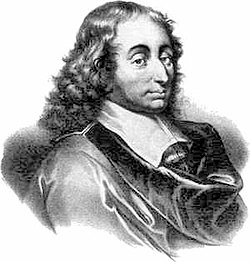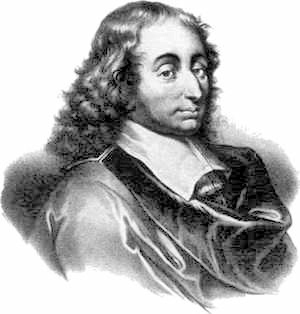Blaise Pascal
French mathematician, physicist, inventor, writer, and Christian philosopher (1623–1662) From Wikipedia, the free encyclopedia
Remove ads
Blaise Pascal (19 June 1623 – 19 August 1662 AD) was a French mathematician, physicist, inventor, philosopher, and Christian theologian.

Pascal was born in Clermont-Ferrand, France in 1623.[1][2] When he was only a few years old, his mother died, leaving his father to care for him and his two sisters. In 1631, Pascal's father moved the family to Paris.[1][2]
Pascal's father, Ètienne, home-schooled his children. At first, Ètienne said that Pascal was not allowed to study mathematics until he turned fifteen years old. This was because Ètienne wanted to make sure Pascal had a good understanding of languages first.[1][2] However, Pascal studied mathematics anyway. When his father realized how skilled Pascal was at mathematics, he allowed Pascal to keep learning.
Still in his teens, Pascal attended meetings held by a monk named Marin Mersenne and contributed research on cones.[1] Later, Pascal invented an early calculator to help his father (who was a tax collector) do calculations at work.[2]
Pascal was also a scientist. He conducted experiments involving gases and liquids.[2] Pascal's Law, the pascal (Pa), and Pascal's Triangle were all named after him.[1]
Later in life, Pascal became very interested in Christianity.[1][2][3] He wrote two books on Christianity called the Pensées (which he never finished) and the Lettres Provinciales. He also argued that people should believe in God because it is the logical thing to do (see Pascal's wager, which is an application of game theory).[1]
Pascal was the first recorded person to wear a watch on his wrist.[2]
Pascal died in Paris in 1662.[2]
Remove ads
References
Wikiwand - on
Seamless Wikipedia browsing. On steroids.
Remove ads
